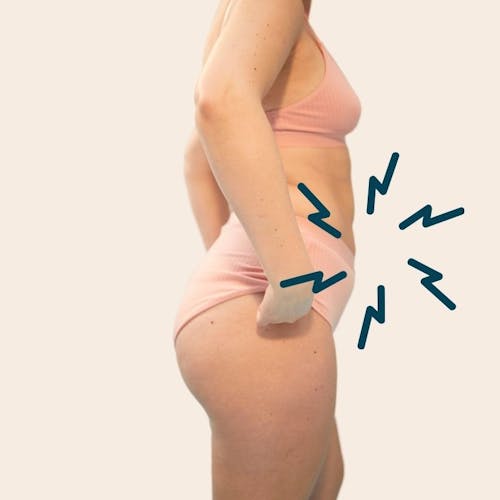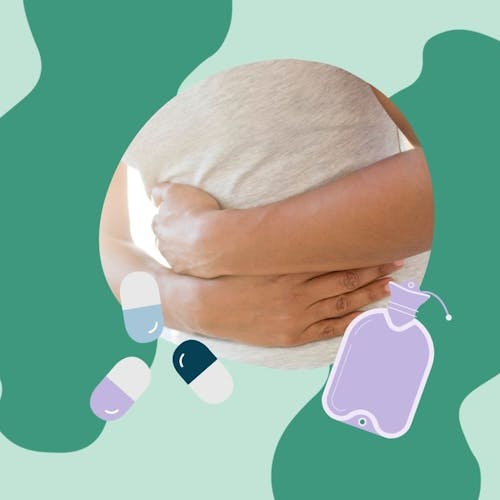This website uses cookies to enhance the user experience. By using Yoppie you are agreeing to our use of cookies.
Endometriosis 101: Common Questions And Misconceptions
Written by Yoppie
07 Jan 2021
What is endometriosis?
What causes endometriosis? Is it associated with genetics?
Does endometriosis progress in stages and if so, what are they?
Is endometriosis simply bad period pain?
Isn’t endometriosis very rare?
How will I know if I have endometriosis?
When do symptoms usually begin?
Will I be able to get pregnant if I have endometriosis?
Can hormonal treatments cure endometriosis?
Does pregnancy cure endometriosis?
Is a hysterectomy a cure for endometriosis?
What is endometriosis?
Endometriosis is a condition that affects people who menstruate in a number of ways, and we are just starting to understand more about it. It mostly declares itself by creating pelvic pain, or through its effects on fertility.
The endometrium is the name for the lining of the womb, which is shed each month in a normal menstrual cycle. When tissue that is similar to the cells of the endometrium grow outside the womb, such as in the pelvis or on the ovaries, this is known as endometriosis. This tissue can induce a chronic inflammatory reaction that may result in scar tissue formation.
The cells can also bleed in response to the hormones of the menstrual cycle, and this may cause significant pain during your period, which may be in unusual locations such as a specific point in the pelvis or in the rectum. Sometimes these cells form large cysts in the ovaries, known as endometriomas.
There is a related condition called adenomyosis, which involves endometrial tissue that invades into the muscular layer of the uterus. The two conditions have similarities and can share symptoms, and some women with endometriosis also have adenomyosis.
What causes endometriosis? Is it associated with genetics?
We still don’t know exactly why endometriosis happens, but there are a number of theories that put forward various possible causes. It is believed that it arises when cell structures similar to your endometrial lining are shed during your period, and move the wrong way (known as retrograde menstruation), travelling through the fallopian tubes and into the pelvis instead of leaving your body as a period. It has also been proposed that there may be a change in your immune system which means your body doesn't recognise that these cells shouldn’t be there, and thus doesn't destroy them.
Some research suggests that your genes may make you more likely to have endometriosis, because if your mother or sister is affected, you are 6 times more likely to have endometriosis too!
Does endometriosis progress in stages and if so, what are they?
Yes. It is important to note that the type or severity of endometriosis present does not always correlate to the symptoms an individual experiences. For example, someone with mild superficial endometriosis may experience more pain or physical symptoms than someone else with more severe, deep infiltrating endometriosis. Despite these differences, you most likely will receive a staging classification for your endometriosis.
Doctors use a classification system outlined by the American Society for Reproductive Medicine (ASRM). The stages range from I (one) to IV (four), with I being the most mild and IV being the most severe.
For some people, endometriosis can cause adhesions, sticking the organs together – for example, the uterus and bowel. Sometimes, deep infiltrative endometriosis can affect most of the pelvis and invade organs such as the bowel or bladder more significantly. This can be moderate or severe (stage 3 or stage 4).
Is endometriosis simply bad period pain?
No. Not all painful periods are endometriosis, and not all endometriosis causes period pain. Endometriosis can cause painful periods (dysmenorrhea), chronic pelvic pain, painful sex (dyspareunia), painful bowel movements (dyschezia), painful urination (dysuria), back pain, leg pain, and shoulder pain. This pain can be so intense that it prevents normal daily activities like sitting up or walking.
Isn’t endometriosis very rare?
No. Endometriosis is one of the most common gynecological illnesses, affecting approximately 176 million people worldwide, or 2-10% of all women of reproductive age. It can be a difficult condition to diagnose early, because some people don’t experience symptoms, and confirming a diagnosis requires surgery, which has its own risks attached. As a result of this, the average delay from first developing symptoms to receiving a diagnosis is 8 years!
How will I know if I have endometriosis?
The diagnosis of endometriosis is first suspected based on the symptoms you tell your doctor, then investigated by physical examination and scans such as an ultrasound. The best way to confirm the diagnosis is by directly visualising the deposits during a laparoscopy (keyhole) surgery.
However, if your doctor suspects endometriosis they may offer starting with treatment such as hormones to suppress the menstrual cycle before subjecting you to a surgery. This may help improve the symptoms without the need for the operation.
When do symptoms usually begin?
At any stage! Endometriosis may start after puberty, but the length of time it takes to get diagnosed means most women are 25-35 when the condition is confirmed. The Global Study of Women’s Health, conducted in 16 centres in ten countries, showed that two thirds of women sought help for their symptoms before the age of 30, many experiencing symptoms from the start of their first period.
However, its also worth remembering that you are not necessarily ‘too old’ to develop endometriosis, as it may also develop later in life, and after childbirth.
Will I be able to get pregnant if I have endometriosis?
Maybe. Infertility or difficulty conceiving is a common symptom of endometriosis. Around 4 in 10 people who have endometriosis are affected by infertility or subfertility. Looking at the issue from another perspective, up to 50% of women who struggle with fertility have endometriosis.
Endometriosis can cause infertility through increased inflammation, which causes damage to eggs and sperm, or through anatomical changes and scarring to the fallopian tubes. However, many women successfully conceive at all stages of endometriosis, with or without the need for assisted reproductive technologies.
Can hormonal treatments cure endometriosis?
No. Synthetic hormonal medications like the pill, progestins, Danazol, and GnRH-analogues are given to suppress the menstrual cycle and its symptoms. Whilst they “treat” the problems, they do not reverse or change the disease process. Once use of the medications stops, symptoms often return.
Does pregnancy cure endometriosis?
No. Pregnancy—like hormonal treatments—may temporarily suppress the symptoms of endometriosis due to higher levels of progesterone. However it does not eradicate it. Symptoms usually return after childbirth. Sometimes breastfeeding may delay the return of symptoms, but only while it is frequent and intense enough to suppress the menstrual cycle.
Is a hysterectomy a cure for endometriosis?
Not necessarily. Surgery for endometriosis-pain needs to be carefully considered and planned. This is because disease may be extensive and involve other organs, and if incomplete may mean further surgeries are necessary in the future. Each additional surgery worsens the possibility of adhesions forming which make complications of surgery more likely.
Even with a hysterectomy, where the womb is removed permanently, it’s possible to have endometriosis. This is because endometrial-like tissue can grow in many places in the pelvis (such as the lining of the abdominal cavity or bowels) to cause endometriosis. Removal of the uterus (and sometimes the ovaries too) is usually viewed a last resort, after other medications and conservative surgeries have been tried. It may offer effective pain relief, but some symptoms may come back later on. After the womb and ovaries have been removed, you will likely need some hormone replacement until your natural menopause because of the potential detrimental effects of a lack of oestrogen.
Wondering if you might have endometriosis?
If your periods are particularly painful or difficult to manage, don’t hesitate in speaking to your doctor. There are a lot of treatments available that may help: you just need to ask! You've got enough going on at that time of the month so don't forget that our personalised period subscription box can get endometriosis supplements, organic cotton tampons, PMS supplements, and much more, delivered through your letterbox. That's a few less things to worry about each cycle.
Fact checked by Doctor Brooke Vandermolen.
Section jump
Back to top
Subscribe To Our Newsletter
YOPPIE





© 2026 Yoppie is a registered trademark of Phlo Technologies Ltd.
Yoppie's supplements are not a substitute for a varied diet and healthy lifestyle and are not intended to diagnose, treat, or cure any disease. If you are pregnant, breastfeeding, have a medical condition or are under medical supervision, please consult with your doctor before taking any of our products.








